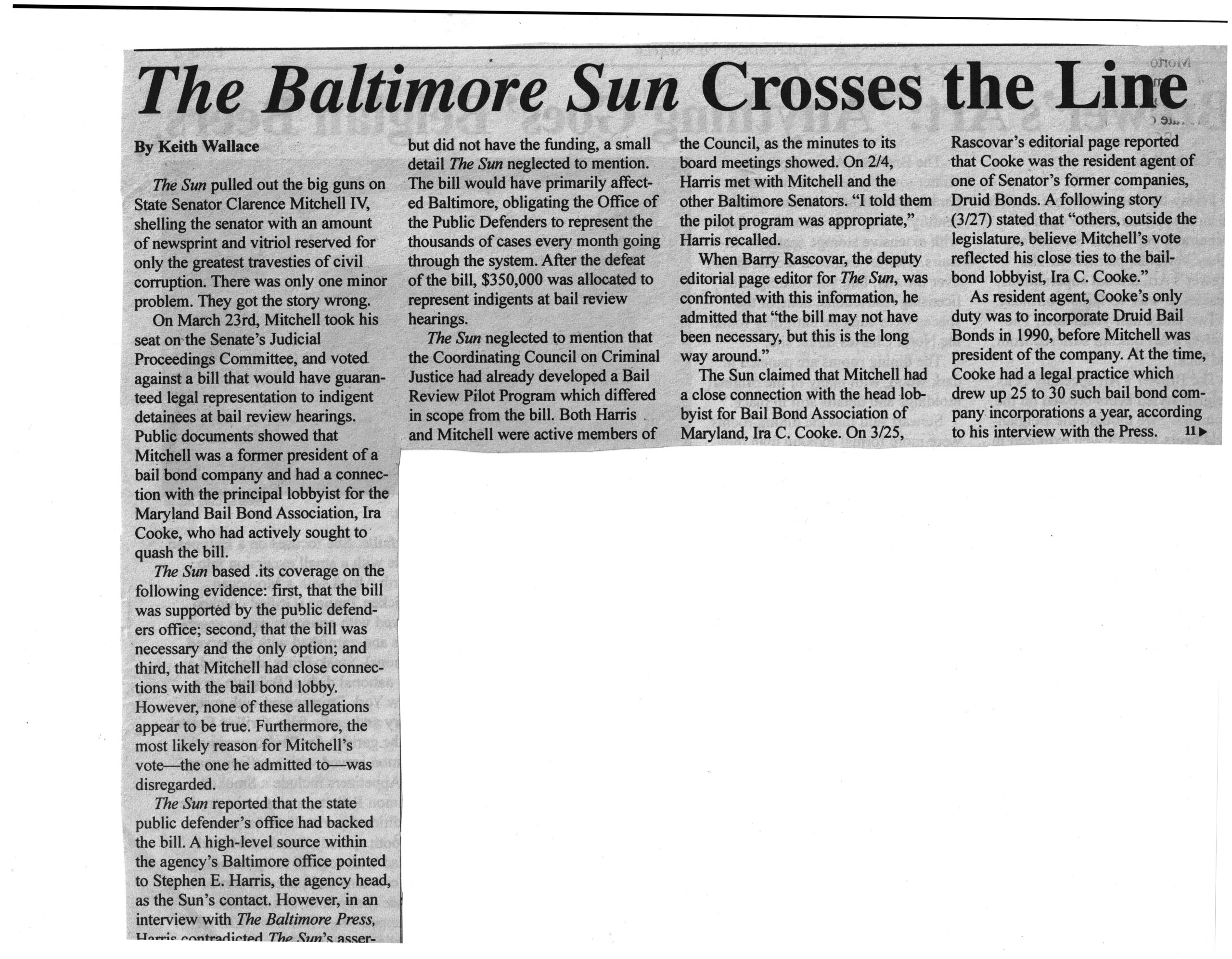The Sun pulled out the big guns on State Senator Clarence Mitchell IV, shelling the senator with an amount of newsprint and vitriol reserved for only the greatest travesties of civil corruption. There was only one minor problem.
They got the story wrong.
On March 23rd, Mitchell took his seat on the Senate’s Judicial Proceedings Committee and voted against a bill that would have guaranteed legal representation to indigent detainees at bail review hearings. Public documents showed that Mitchell was a former president of a bail bond company and had a connection with the principal lobbyist for the Maryland Bail Bond Association, Ira Cooke, who had actively sought to quash the bill.
The Sun based its coverage on the following evidence: first, that the bill was supported by the public defenders office; second, that the bill was necessary and the only option; and third, that Mitchell had close connections with the bail bond lobby. However, none of these allegations appear to be true. Furthermore, the most likely reason for Mitchell’s vote—the one he admitted to—was disregarded.
The Sun reported that the state public defender’s office had backed the bill. A high-level source within the agency’s Baltimore office pointed to Stephen E. Harris, the agency head, as the Sun’s contact. However, in an interview with The Baltimore Press, Unrrw ASSeT-
the Council, as the minutes to its board meetings showed. On 2/4, Harris met with Mitchell and the other Baltimore Senators. “I told them the pilot program was appropriate,” Harris recalled.
When Bany Rascovar, the deputy editorial page editor for The Sun, was confronted with this information, he admitted that “the bill may not have been necessary, but this is the long way around.”
The Sun claimed that Mitchell had a close connection with the head lobbyist for Bail Bond Association of Maryland, Ira C. Cooke. On 3/25, but did not have the funding, a small detail The Sun neglected to mention. The bill would have primarily affected Baltimore, obligating the Office of the Public Defenders to represent the thousands of cases every month going through the system. After the defeat of the bill, $350,000 was allocated to represent indigents at bail review hearings.
The Sun neglected to mention that the Coordinating Council on Criminal Justice had already developed a Bail Review Pilot Program which differed in scope from the bill. Both Harris and Mitchell were active members of Rascovar’s editorial page reported that Cooke was the resident agent of one of Senator’s former companies, Druid Bonds. A following story (3/27) stated that “others, outside the legislature, believe Mitchell’s vote reflected his close ties to the bail-bond lobbyist, Ira C. Cooke.”
As resident agent, Cooke’s only duty was to incorporate Druid Bail Bonds in 1990, before Mitchell was president of the company. At the time, Cooke had a legal practice that drew up 25 to 30 such bail bond company incorporations a year, according to his interview with the Press.
When Mitchell incorporated another bail business in 1995, the resident agent was not Cooke but Mitchell.
Cooke strenuously denied The Sun’s characterization of him as being a “close tie” to Mitchell. “I have never been to his house,” he said, “I have never been out with [Mitchell], except in large groups.” He further insisted that he had never made a campaign contribution to Mitchell, nor had visited his offices during the legislative session.
The Sun labeled Mitchell’s vote as “decisive,” but it was not. Had he abstained from voting due to a conflict of interest, the bill would still not have passed. Even had the bill passed, its effect on bail bondsmen would be hard to fathom, a fact that both sides of the debate agreed upon, even if The Sun did not. The author of the bill, Professor Douglas Colbert of the University of Maryland School of Law, stated that lawyer’s presence at bail review hearings would likely reduce bails, and “allow people to afford Bail Bondsmen’s services.” Cooke labeled the bill as “feel-good legislation.”
Why did Mitchell vote against die bill, rather than simply abstaining? Politics. Mitchell was sponsoring a Civilian Review Board Bill, which would give the citizens of Baltimore a monitoring body over the police department. Mitchell had sponsored a similar Citizen’s Review Board Bill a year ago, when he was a delegate, but it had died in a the House’s Judiciary Committee without coming to a vote.
Mitchell has admitted to swapping his vote on the Bail Review Bill, to insure the passage of the Civilian Review Board this year. Oddly enough, after the bail review bill died, the Civilian Review Bill not only passed through the House’s Judiciary Committee, but 20 of the 22 members of the committee voted for it, include incomplete, the questioning of Senator Mitchell’s conflicts of interest is not unfounded. In 1996, Mitchell sponsored a bill, that directly affected the bail bond industry. At that time, he was still president of a bail bond company. According to Barry Udoff, the president of the Bail Bond Association of Maryland, his organization was supporting the bill, via their chief lobbyist, Ira C. Cooke.

